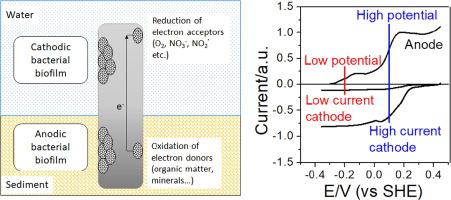Bioelectrochemistry ( IF 4.8 ) Pub Date : 2021-07-24 , DOI: 10.1016/j.bioelechem.2021.107895 Joanna Rogińska 1 , Michel Perdicakis 1 , Cédric Midoux 2 , Théodore Bouchez 2 , Christelle Despas 1 , Liang Liu 1 , Jiang-Hao Tian 2 , Cédric Chaumont 3 , Frédéric P A Jorand 1 , Julien Tournebize 3 , Mathieu Etienne 1

|
Microbial electrochemical snorkel (MES) is a short-circuited microbial fuel cell applicable to water treatment that does not produce energy but requires lower cost for its implementation. Few reports have already described its water treatment capabilities but no deeper electrochemical analysis were yet performed. We tested various materials (iron, stainless steel and porous graphite) and configurations of snorkel in order to better understand the rules that will control in a wetland the mixed potential of this self-powered system. We designed a model snorkel that was studied in laboratory and on the field. We confirmed the development of MES by identifying anodic and cathodic parts, by measuring the current between them and by analyzing microbial ecology in laboratory and field experiments. An important application is denitrification of surface water. Here we discuss the influence of nitrate on its electrochemical response and denitrification performances. Introducing nitrate caused the increase of the mixed potential of MES and of current at a potential value relatively more positive than for nitrate-reducing biocathodes described in the literature. The major criteria for promoting application of MES in artificial wetland dedicated to mitigation of non-point source nitrate pollution from agricultural water are considered.
中文翻译:

实验室和人工湿地微生物电化学通气管的电化学分析
微生物电化学通气管 (MES) 是一种短路微生物燃料电池,适用于水处理,不产生能量,但实施成本较低。很少有报道描述其水处理能力,但尚未进行更深入的电化学分析。我们测试了各种材料(铁、不锈钢和多孔石墨)和通气管的配置,以便更好地了解在湿地中控制这种自供电系统的混合潜力的规则。我们设计了一个模型通气管,在实验室和现场进行了研究。我们通过识别阳极和阴极部分、测量它们之间的电流以及分析实验室和现场实验中的微生物生态学,证实了 MES 的发展。一个重要的应用是地表水的反硝化。在这里,我们讨论了硝酸盐对其电化学响应和反硝化性能的影响。引入硝酸盐导致 MES 和电流的混合电位增加,其电位值比文献中描述的硝酸盐还原生物阴极的电位值相对更正。考虑了促进MES在致力于减轻农业用水非点源硝酸盐污染的人工湿地中应用的主要标准。











































 京公网安备 11010802027423号
京公网安备 11010802027423号